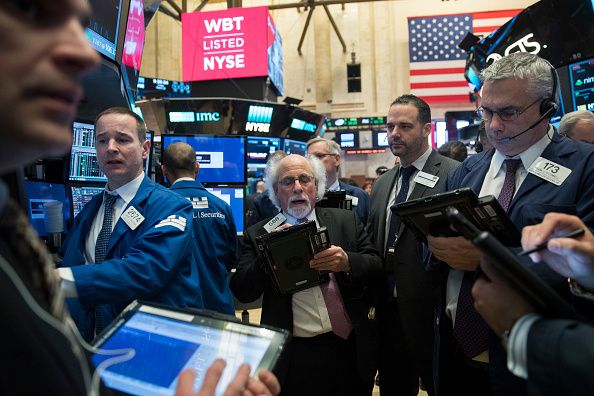 U.S. stocks may be trading at historically expensive valuations, but that hasn’t curbed the enthusiasm of fund managers, investment bankers and analysts, who’s bullishness could provide some inspiration to CEOs pestered by lingering political uncertainty.
U.S. stocks may be trading at historically expensive valuations, but that hasn’t curbed the enthusiasm of fund managers, investment bankers and analysts, who’s bullishness could provide some inspiration to CEOs pestered by lingering political uncertainty.
After talking to 554 investment professionals across the globe, PwC found 45% were “very confident” about economic growth. That’s more than double last year’s 22% and comes as the U.S. economy continues to go from strength to strength.
On Friday, for instance, government data showed the U.S. added a better-than-expected 235,000 jobs in February, helping to trim the unemployment rate to 4.7% from 4.8% and raising expectations the Federal Reserve will hike interest rates this month.
PwC’s survey was conducted between November and December, so it would have mostly factored in Donald Trump’s election and its possible implications for tax, trade, regulation and infrastructure policies. Its separate survey of CEOs—conducted between August and November—found that a more modest 29% were very confident about global economic growth, up only slightly from 27% in 2016.
Indeed, Chief Executive’s February CEO Confidence Index found that leaders’ confidence in future business conditions (12 months from now) seemed to have flattened out compared with the three months after Trump was elected. February’s 6.99 (on a scale of 1-10 with 10 being the highest), was a slight drop from January’s 7.07. Conversely, their confidence in future business conditions rebounded significantly in March to 7.41, a 6% jump, after Trump began to dismantle Obamacare and other regulations.
Apart from the fact that PwC’s CEO survey may not have entirely captured the Trump effect, reasons for the apparent bearishness relative to wealth managers is unclear. It’s possible that CEOs—keen to under-promise and over-deliver—were more inclined to take a conservative approach to forecasting. CEOs also know firsthand about the threats posed to their businesses from structural challenges, such as digital disruption.
“Investment professionals around the world are remarkably upbeat about global economic growth prospects, despite recognizing the shifting political landscape in which companies operate,” PwC’s vice-chairman Richard Sexton said. “They certainly don’t expect the globalization process to stop or be reversed.”
Still, like CEOs, investment professionals listed geopolitical uncertainty as a major concern, along with protectionism, the uncertain future of the Eurozone and social instability. Interestingly, 19% predicted technology would completely reshape competition within five years.
The survey also found that the aims of CEOs and investment professionals weren’t always aligned, especially when it came to the importance of short-term versus long-term strategies and returns on investment. For example, although 85% of CEOs placed importance on responding to wider stakeholder expectations, only 70% of investment professionals shared such concerns.
The investment community doesn’t appear to be fully recognizing the pressure CEOs are under to follow a stake-holder inclusive approach and focus on corporate purpose, Sexton said. “Both point to CEOs needing to explain their thinking more clearly so that investment professionals’ views become more closely aligned with theirs,” he said.
Chief Executive Group exists to improve the performance of U.S. CEOs, senior executives and public-company directors, helping you grow your companies, build your communities and strengthen society. Learn more at chiefexecutivegroup.com.
0

1:00 - 5:00 pm
Over 70% of Executives Surveyed Agree: Many Strategic Planning Efforts Lack Systematic Approach Tips for Enhancing Your Strategic Planning Process
Executives expressed frustration with their current strategic planning process. Issues include:
Steve Rutan and Denise Harrison have put together an afternoon workshop that will provide the tools you need to address these concerns. They have worked with hundreds of executives to develop a systematic approach that will enable your team to make better decisions during strategic planning. Steve and Denise will walk you through exercises for prioritizing your lists and steps that will reset and reinvigorate your process. This will be a hands-on workshop that will enable you to think about your business as you use the tools that are being presented. If you are ready for a Strategic Planning tune-up, select this workshop in your registration form. The additional fee of $695 will be added to your total.

2:00 - 5:00 pm
Female leaders face the same issues all leaders do, but they often face additional challenges too. In this peer session, we will facilitate a discussion of best practices and how to overcome common barriers to help women leaders be more effective within and outside their organizations.
Limited space available.

10:30 - 5:00 pm
General’s Retreat at Hermitage Golf Course
Sponsored by UBS
General’s Retreat, built in 1986 with architect Gary Roger Baird, has been voted the “Best Golf Course in Nashville” and is a “must play” when visiting the Nashville, Tennessee area. With the beautiful setting along the Cumberland River, golfers of all capabilities will thoroughly enjoy the golf, scenery and hospitality.
The golf outing fee includes transportation to and from the hotel, greens/cart fees, use of practice facilities, and boxed lunch. The bus will leave the hotel at 10:30 am for a noon shotgun start and return to the hotel after the cocktail reception following the completion of the round.